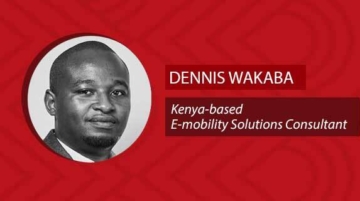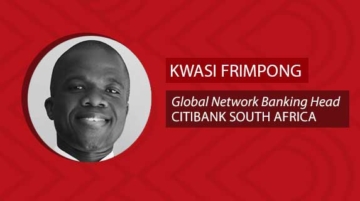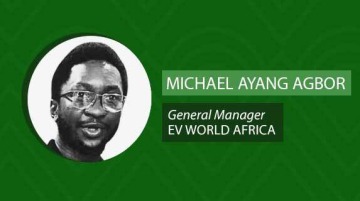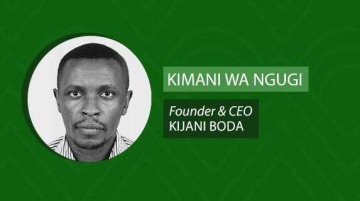
The electric shift in many African countries is largely silent where unique approaches are solving daily transport problems caused by lax government policies that have left glaring gaps.
In countries like Kenya, where public transport is unpredictable yet remains the primary mode of commute, an under-the-radar electric vehicle revolution is underway, aiming to offer localized solutions.
In this episode of The Africa EV Show, Njenga Hakeenah speaks with Peter Kihara, the visionary behind Teachers Transporters, a transport agency in Kenya’s chaotic matatu industry that is now offering affordable electric vehicles to commuters across two, three and four-wheelers.
Kihara shares his incredible journey from the traditional transport industry to becoming a pioneer in customizing and importing Chinese electric vehicles ranging from motorcycles to tuk-tuks and small cars- specifically designed for Kenyan needs.
He reveals how he travels to China with designs “in his brain” to create affordable, practical EVs for the Kenyan market.
Show Notes:
- The China Global South Project: The Underground EV Revolution Driven by a Kenyan’s Billion-Dollar Vision by Njenga Hakeenah
- KBC: Accelerating E-Mobility
- The China Global South Project: Small Chinese EV on Lease Promises Big Savings For Kenya’s Taxi Drivers by Njenga Hakeenah
About Peter Kihara:
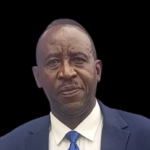
Peter Kihara is the CEO of Teachers Transporters Agency. The former teacher got into Kenya’s transport industry in the 80’s and has gained experience over that period.
He plans to transition his public transport fleet to electric vehicles to reduce costs and emissions.
In addition, Kihara’s efforts are aimed at making EVs more accessible through strategic financing partnerships.
He is also a vocal advocate for sustainable transport to address climate change concerns.
Transcript:
NJENGA HAKEENAH: Hello, guys, and welcome to another very exciting episode of The Africa EV Show.
My name is Njenga Hakeenah and today I am in the center of Nairobi whereby some activities in the electric vehicle sector may be termed as underground until you get to speak with people and you realize, oh wow, the EV shift is happening and it is happening in a customized way.
Services and products for the African people according to the needs that they have and so today we get to speak with one of the brainchild behind Teachers Transporters, that is a transportation company in Kenya for several years, and then he was like, we can also do this, but the electric way.
So today I am joined by Peter Kihara who is in charge of this Teachers Transporters Agency and he is selling these electric vehicles and then you will get to see how this silent shift is happening across Africa because I believe this is not an isolated case.
There is a way that Africans tend to find solutions for their problems and this is where the government has always failed and has left gaps. But with Peter, we’ll get to see how this silent quiet shift is happening in Kenya under the radar, because this is so under the radar, I never expected it until I came across a TikTok video you know about these teachers and the teasing that was happening and then I was like I have to look for these guys and I have found them.
Thank you very much, Peter, and it’s very good to have you and we have seen the work that you are doing with all these vehicles and all of them are Chinese, right?
PETER KIHARA: All of them are Chinese electric.
NJENGA HAKEENAH: They are electric Chinese cars.
PETER KIHARA: Yes.
NJENGA HAKEENAH: Where do you source them from and what is the process like?
PETER KIHARA: This is a process that was done for quite a while and I have been doing it for many years. It is only in the practice I have done it in the last three years.
NJENGA HAKEENAH: Okay.
PETER KIHARA: I normally go to China myself. I have the design in myself. I hold it in my brain.
Like an architect who builds a story building. He has it in himself. So what you can see here is exactly what I have in myself. It’s a big idea that I want to bring to our people in Kenya.
NJENGA HAKEENAH: You have described the process whereby you have to travel to China and also the design. So do you have a role in designing these vehicles?
PETER KIHARA: Yes. I have been initially in the transport industry for a long time and exactly what I want is what I give. I customise what I want to be here in Africa and in Kenya.
The good part is that the Chinese are better people. You give them a design, they give you exactly what you want.
NJENGA HAKEENAH: Peter, you are a Kenyan dealer competing in this space with Chinese dealers as well, who are likely to be getting the same kind of vehicles as you at a fraction of the price that you do. How is this affecting your business and how do you see it?
PETER KIHARA: That’s a good insight because this is a world of competition, whereby you don’t fear the competitors. What you know is that you make your product unique. So they are there and they are also in business and all of us have got our range. So it depends on what you produce, how better quality you have and how well it is adapted to your people.
So I don’t fear the competition with them because we have been there in the last three years in the field. In fact, we are doing better.
NJENGA HAKEENAH: Nice. And also you have mentioned that you customise the bikes that you have. You customise them and I’ve seen that like if I needed a spare part for that bike I would get it locally. Probably what would be a challenge is getting the exact battery but if I needed to replace the seats, the lights or the wheels or the brake system that I would get locally. So do you see that as an advantage over someone who is thinking this is what the Africans need or the Kenyans need and you who is like I am in this space I know what this rider wants. Is that an advantage for you?
PETER KIHARA: It is totally a big advantage because being in the transport industry for a long time and being in the field for working myself I have known the challenges that are there with my people and the strains that we have in Africa. So when I’m going across to design I know exactly what the customers need. So I do exactly, I customise that one and I am better placed than any other person when it comes to the competition of the good product.
NJENGA HAKEENAH: And now that you have been to China where these vehicles are coming from are we able to do that here? Because I know we are assembling these vehicles locally. Where you have been to China are we able to replicate that and say we can do the same things they are doing there here?
PETER KIHARA: Comparing ourselves with the Chinese it is like heaven and earth. These people are advanced many years before us because when you go there you will find that the percentage or is especially on the two wheelers it is about 90 percent whereas in Kenya here we are starting. We are we are below two percent. So you can see the range how many years are we going to put ourselves to move together as the Chinese.
So they know the advantages of the electric vehicles and that is why they are in the first world country. The way we do things is exactly in the third world but the the beauty part of this is that when we move forward we have a chance also to become great starting with myself with my team here and with the uniqueness that we have because we we can do it here as well. Although it is a long journey we have taken because our technician we had informed the Chinese to train them because we have a big future on this electric and supporting this green energy movement.
NJENGA HAKEENAH: And I think when you talk about the future that is where we should be aiming because I believe that what you have seen in China is also possible to be done here. We may be several years behind but there are some aspects that we can bring and start doing those locally and you already have started because if you can design it here and tell them just give me this then we have already started.
PETER KIHARA: We have started it is a long journey but with a lot of combined effort I’m telling you it will move very fast and that is the future.
NJENGA HAKEENAH: That’s the future?
PETER KIHARA: Yes.
NJENGA HAKEENAH:Okay. Now we’ve had this statement many times that many Kenyans cannot afford vehicles. They cannot afford to buy cars because of their price and also the maintenance costs but what were the key considerations that you made before you decided to be selling vehicles in Kenya?
PETER KIHARA: Electric and any new product that comes to the market has got bigger challenges and one of the hindrances to first moving on electric technology is the cost of the product because like us we are using lithium batteries.
A lithium battery is quite expensive in terms from the production to the consumer but when you come to compare the cost of fuel that one takes for every single day when you translate that one in a month to one year it is that you realize that it is better that you buy these high cost electric vehicles because you automatically become a money maker because all that money goes to the fuel yeah it will come back to you.
PETER KIHARA: For instance, I myself am using this for marketing
NJENGA HAKEENAH: Yeah.
PETER KIHARA: And this vehicle as you compare to my gasoline vehicle, it uses three thousand in one day, so that translates to almost ninety thousand in one month which translates to nine hundred thousand Kenya money in ten months, which is almost enough to buy…
NJENGA HAKEENAH: Another car.
PETER KIHARA: Yeah. So when I’m using this one I’m saving this money and this is the beauty. This is the uniqueness of the electric technology.
NJENGA HAKEENAH: So we can make savings we buy the electrics we make savings as we drive and not complaining about the price. And also you have arrangements with financiers right that if I don’t have cash up front, I can come get a loan from whoever and then I’ll be paying pole pole, right?
PETER KIHARA: Right right. Our our business is full contained whereby we import we we give on a lease-to-own whereby because we understand the economy of this market we allow you to give something small. We work together we support you we give you a better after-sales service. You only need to take care of the vehicle because it’s going to be yours at the end of the day. And by this is whereby we make all of us a better life because you know how to operate a car you work with it, you give us what we say lipa pole pole and we support you with after-sales service and eventually we become better people by having the knowledge to make money.
NJENGA HAKEENAH: Nice. Green mobility.
PETER KIHARA: Yes.
NJENGA HAKEENAH: And you’re about two years old in this business, probably over. How many vehicles did you initially import into Kenya and how have the numbers changed since?
PETER KIHARA: We started first of all with the two wheelers and we came to realize that there is a big market on the small vehicles because of the uber transport. And for the first year, we started with the motorcycles, whereby you start small then you grow big. And I can say that we are doing well on the two-wheelers and now we are better also doing well on the small cars. The challenge, the big challenge on importing the the the small cars and the tuk-tuk is the delivery because they take the they take a big space. So for a 40-foot container you just take a few numbers of vehicles and tuk-tuks.
NJENGA HAKEENAH: Okay.
PETER KIHARA: So you cannot be able to bring them as many as you want. And also when you come to the terms of the the government taxes this is a big challenge. But, however we are there we have sold our product and in the near future we want also to embrace partners. These partners we can now be able to import many of such vehicles and tuk-tuk and then eventually our target is up to 100,000 in the next five years.
NJENGA HAKEENAH: Alright. Over those two years, how have you seen customer preferences change, like maybe some someone came and bought your bike electric bike and then after a while they are like, now I want a car. Have you seen those changes?
PETER KIHARA: This one is like the time that we got the mobile phones. People were resisting. Can the mobile phone send money? Can the smartphone replace a camera? But now they have embraced it only that we have a big challenge on Africans adoption. But I’m telling you we are using now the referrals to sell. Those people who bought from us are the ones that are giving us the customers they are moving they are making money.
NJENGA HAKEENAH: Yeah.
PETER KIHARA: Electric vehicles and the tuk-tuk and the motorcycle. We are seeing they are money makers. Those people are still in doubt they will find these people moving day in day out because the cost of working with this one is 100 percent electric whereby you don’t have the emissions you don’t have to use to go to filling station. You don’t have to go to the services. We do it ourselves so for you this is the the beautiful part of it yeah that you make money without uh making it go to the fuel cost.
NJENGA HAKEENAH: Nice so the preferences are changing and people are referring?
PETER KIHARA: I’m telling you the next five years you have moved to another level.
NJENGA HAKEENAH: Another level. Do you also bring in other brands like you go to China, you find oh, these are cars that can work in Kenya or this is a tuk-tuk that can work in Kenya. Do you also look at other brands that have already been designed there and you’re like I want to bring this home?
PETER KIHARA: There are multiple brands that uh that are good but for for a company that is having a vision you concentrate on the what you know is going to do well in the market. So we we have our own uniqueness whereby if you come to visit us you will find that our products are special. They are good they are customized and uh a guarantee. So we are better on this because we thought that it is good to to embrace ourselves on it.
NJENGA HAKEENAH: Yeah
PETER KIHARA: To make ourselves better people.
NJENGA HAKEENAH: Okay and you’re still in at work, I see people are still looking for you.
PETER KIHARA: Yeah. I want to yeah yeah they are referrals
NJENGA HAKEENAH: You can tell them to wait a bit…
PETER KIHARA: Yes.
NJENGA HAKEENAH: In Kenya I have seen because I’ve been in this space and I’ve been looking at these vehicles and the trends I have seen vehicles which look like yours and some like even the tuk-tuks they have started assembling them locally. I know you have said that competition is good. Do you think that this will be good competition for you who is importing and somebody who is locally assembling and will it affect your business in a way?
PETER KIHARA: Yes. I am saying it can uh it is a way of improving even what we are doing ourselves and when we have the locally assembled I know it is also going to be a big challenge because of the production. For us we have an advantage because we make them there they are ready on the market and here there are several challenges when you come to do it to yourself so we’ll embrace one another at the end of the day okay and we’ll make good products for our people so that eventually all of us will benefit.
NJENGA HAKEENAH: And I’m looking at that from the perspective of imagine if an aspect of this vehicle was done here say maybe it was assembled here or you know some materials were produced here so I think that is a good thing and probably even eventually shifting to saying instead of going to China now that KVA is assembling you can be doing that as well, right?
PETER KIHARA: Right that should be the best way to go because build Kenya and we buy Kenya and I am hoping that is going to be the direction whereby our government needs to work on this. The investors also need to understand about it and it is a teamwork that will make us minimize the cost of these products.
NJENGA HAKEENAH: Okay.
PETER KIHARA: So I know in the future and near future is that we are going to have this with us.
NJENGA HAKEENAH: Is your business the sole proprietorship or are you in partnership?
PETER KIHARA: When I’m saying that this company is a billion company, it means that we are the shareholding. It is a limited company whereby we we want to embrace the the shareholders. We want also investors to also invest with us and this is almost 100 percent going to give us productivity because we have tested it well and we know we can give a better rate than any other people in the finance industry. The company is sold it is there and we are expanding it so that we maintain to that level we want to offer a billion company.
NJENGA HAKEENAH: And all the best. In China when we talk about electric vehicles there are many many many many companies that are competing for markets. China is saturated already but we know in markets like in Kenya, across Africa and outside of China, these companies are competing against each other. So how do you because you’re you’re going with your design but then you’re saying like if we find something we are going to implement it here. But if you bring in brands that have already been developed there by these competing companies how do you leverage that competition to get the best quality and the best price for your vehicles?
PETER KIHARA: When we say that we are customizing our product, we say that the Chinese technology is well because we import them in CKD or SKD whereby we have also our assembling points because this one make it a bit also competitive because when you assemble to here there is a certain duty that is…
NJENGA HAKEENAH: That you manage to save…
PETER KIHARA: Yes which allow you a mileage on the competition. So we keep changing, we keep adapting to what is there.
NJENGA HAKEENAH: Maybe the next story that you will do is you will be somewhere assembling your own. We will be at KVA in Thika or in Mombasa…
PETER KIHARA: We have already a main one whereby we want to bring it up at Babadogo, where we do our assemblies.
NJENGA HAKEENAH: Okay.
PETER KIHARA: Where we have our technician and soon we are going to embrace
NJENGA HAKEENAH: Nice.
PETER KIHARA: Because we we have seen a big challenge in our in this industry of electric because they are expensive but we can retrofit…
NJENGA HAKEENAH: Yeah.
PETER KIHARA: The fuel, especially the two-wheelers we have started with the motorcycle we retrofit with the relevant authority to make this one electric. We are making it 100 percent which is relatively a bit cheaper for our people.
NJENGA HAKEENAH: Okay
PETER KIHARA: So in the market I was feeling that the two thousand, two million riders in Kenya, some of them cannot be able to buy new product. So we are there we are retrofitting for them at a better rate and soon we are going to take our share in this market in Kenya and also in Africa.
NJENGA HAKEENAH: When you talk about retrofitting also I see upcycling and recycling because when we move from you know like instead of discarding a bike just because it is old.
PETER KIHARA: Yes.
NJENGA HAKEENAH: We just you know kind of upgrade it and make it electric yes and so we e-waste management and waste management from vehicles. So I think it’s a it’s a good thing because you’ve been in this business. You said you’ve been in transport for a long time and then you started your own business, what is the biggest obstacle or challenge that you need to overcome to succeed doing this business in Kenya?
PETER KIHARA: You come to understand for every business that initially, there is this big challenge of adoption. People resist change. People don’t understand very fast what the beauty is in this technology and the challenge of marketing is unique. But I’m happy because we have the online marketing we have people like you now who are doing it well and we are going to overcome this challenge it is there and I know we will overcome.
NJENGA HAKEENAH: Like you mentioned earlier, the government has also to play a role not just looking at how much can we get in terms of taxing but also in terms of how can we create a better environment for these businesses to thrive right?
PETER KIHARA: Like us our main objective when you see what we are doing we want also to be champion on green energy to make environment better for all of us including the animals the plants and what have you. We have realized that we are the contributors especially on the carbon emission so when we are retrofitting these motorcycles and the tuk-tuk we are trying to minimize this small mile from one motorcycle to our tuk-tuk that emits a carbon monoxide we want to so eventually we’ll be there in business and also as champion on our green energy
NJENGA HAKEENAH: You have a big vision for this business and you want it to be a multi-billion business and also the fact that you have made these strides and you have come this far. It’s it’s just two years but where do you see the Kenyan EV market in the next five in the next ten?
PETER KIHARA: I was doing a research and data and I found that for the last many years, Kenya has moved from zero to four percent.
NJENGA HAKEENAH: There is growth.
PETER KIHARA: Yes there is growth and with the adoption and the government support and us in the business now as investors we I’m telling you we’ll move it to ten percent. And the next five years, the government proposal is that we go to fifty percent. We might not be there but I’m telling you you’ll be somewhere the next five years because you cannot avoid change. We will realize the importance of this new technology and we’ll adapt it. So I’m hoping that as this company goes to the next five years we have our own target, it’s the next ten years. I’m telling you we will have scoped just ten percent of the two million motorcycles that are there. if we only take ten percent it is going to be two hundred thousand pieces and that one is going to make a big move a big stride yes to the percent that we are helping our government to help us to have a healthy environment and a better future for all of us.
NJENGA HAKEENAH: Thank you so much Peter. It’s been very insightful speaking with you and seeing the you know the progress that you have made over the past two years. Congratulations and keep going we really need to see this space growing because I know like for instance we could save billions in terms of fuel costs and you know Kenya is a net importer. So when we are importing everything else, including the fuel that should be driving our economy then it becomes a little bit expensive and it’s weathers or erodes our shilling or the value of our currency. So what you’re doing is good and I believe that when we look at it and getting to fifty percent, I think when you you talk about fifty percent of Kenya’s mobility being electric we would save not less than 20 billion every six months you know so you do make sense. It does make sense that you are doing this.
PETER KIHARA: That is the beauty part of the life that we become part of this all of us.
NJENGA HAKEENAH: Thank you so much, Peter for that very insightful conversation. I am looking forward to seeing Kenyans, and we Kenyans, like you and myself see these changes and experience them in our lifetime and also hitting those milestones and seeing how much we can do when we manage to do most of this stuff locally.
Again, guys it’s been a very special episode of the africa ev show my name is Njenga Hakeenah remember to like share and subscribe and as always, if there is something that is happening within your community within your area within your city within your region let us know and we’ll be coming to you because we cannot know until we get to have these conversations shared and people sharing their experiences and insights where we get to see how Africa is changing when it comes to green mobility.
I look forward to seeing you again soon.



